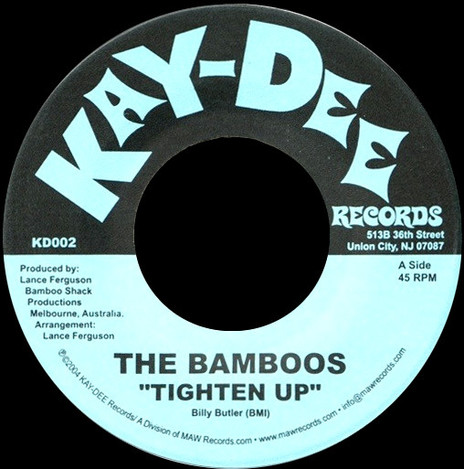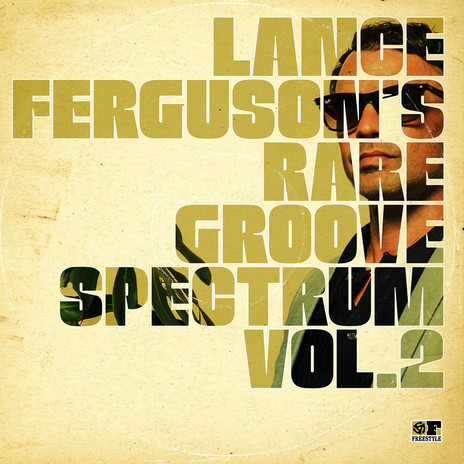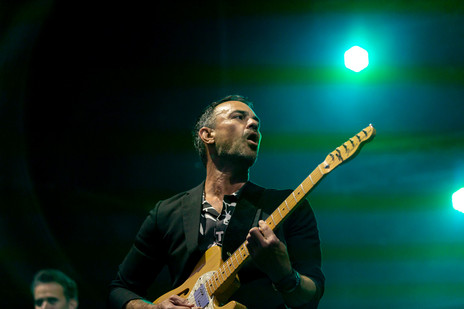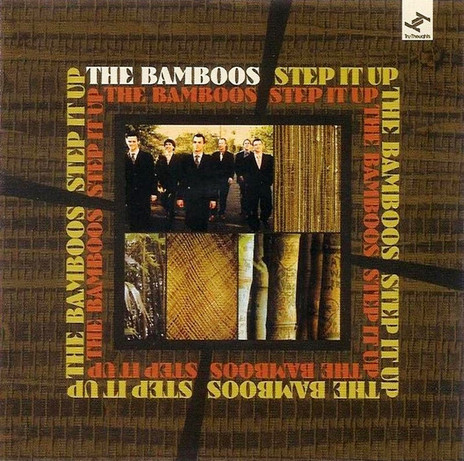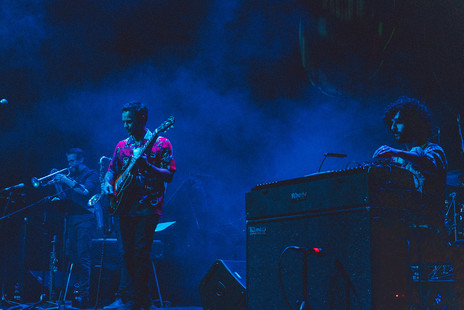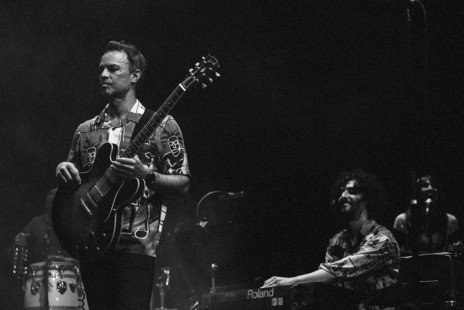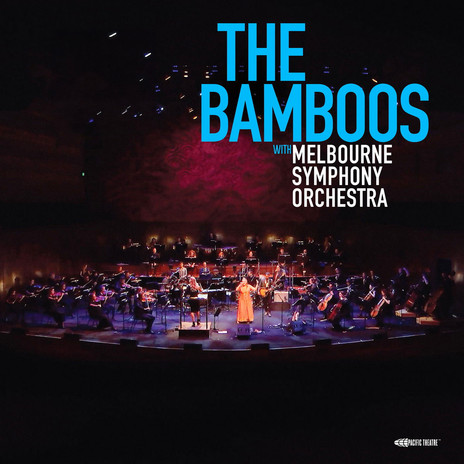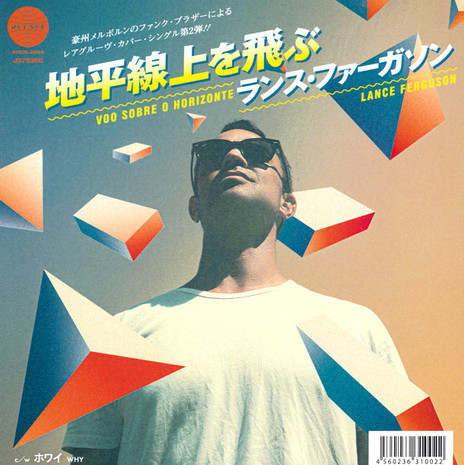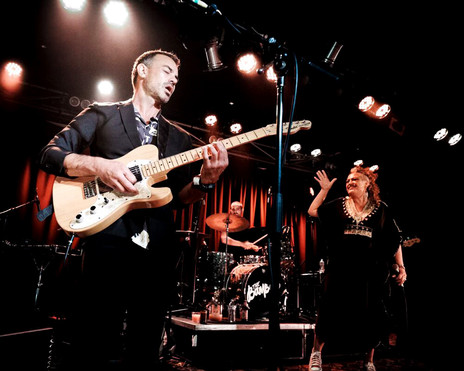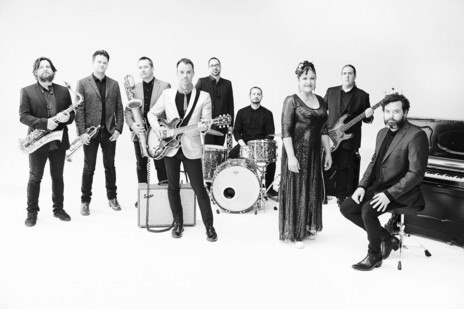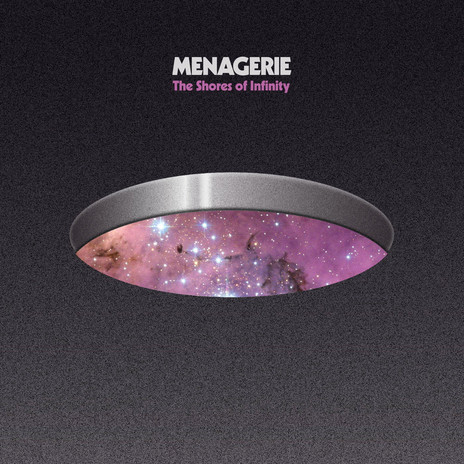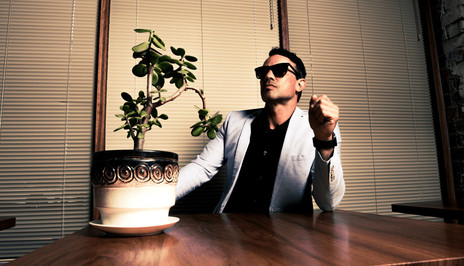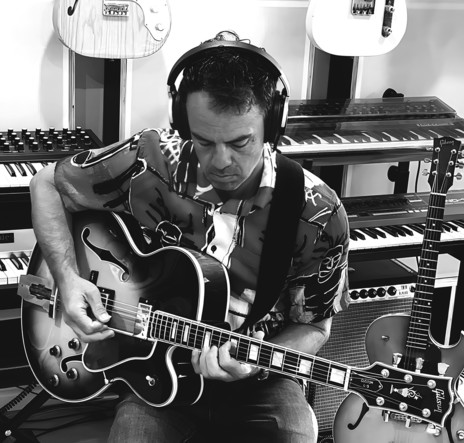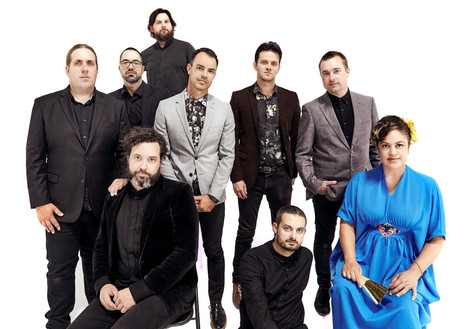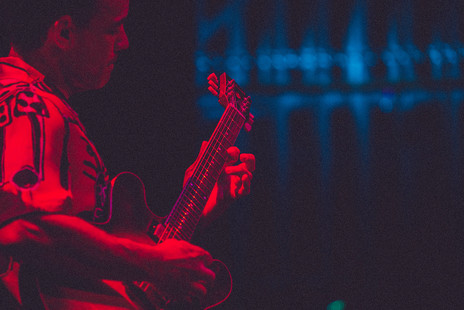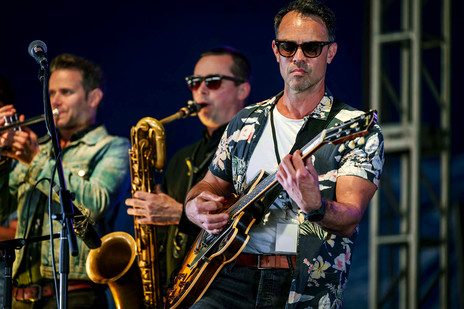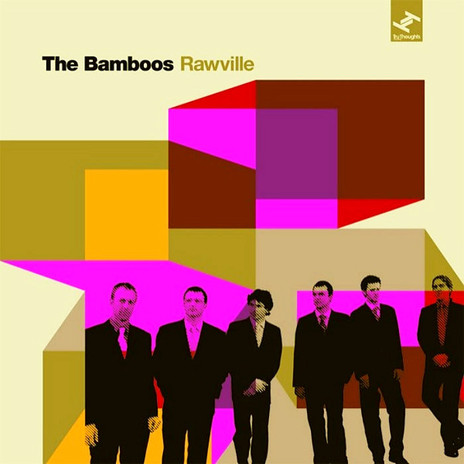He lovingly ties that to the majestic and now preserved giant flying boats at MOTAT, aircraft which his father used to take him to see as a child (when they were still derelict beside Auckland’s Meola Road). The video ends with a warm and moving final interview with the great Bill Sevesi, one where they talk of the old days in Tāmaki Makaurau and of Lance’s famous grandfather.
Lance Ferguson’s grandfather Bill Wolfgramm filled Auckland’s ballrooms in the 1950s
Lance Ferguson’s grandfather was no ordinary musician, he was probably the most popular bandleader in Auckland in the 1950s, a man whose bands filled ballrooms of the city for years with his Pacific styles and rhythms. Bill Wolfgramm was one of our earliest pop stars. He also provided the soundtrack to the TEAL Airways promotional film made for the Coral Route in 1951 and recorded a catalogue of now very collectable records for Tanza and Viking which captured the Pacific sounds that he helped make so popular in his adopted home.
Lance grew up mostly in West Auckland, with periods elsewhere including Tauranga. His birth mother was Kaye Wolfgramm, a singer whose voice was described by her other son (and Lance’s brother) Joseph in his AudioCulture profile as boasting the depth and soul of Chaka Khan. She was one of the stars of the inner-city Auckland club scene in the 1970s as the featured vocalist with the great Cruise Lane, a band which also included Lance and Joe’s dad, Steven Wilson. It’s hard to think of anyone with more music in their DNA.
Lance was adopted and raised by Kathleen Ferguson, his grandfather Bill’s first wife, and her second husband Richard Ferguson. Taking his stepfather’s surname, he went to Waitakere College in Henderson, where his musical activities were mostly limited to a hip-hop group around 1988. It was early days for the genre locally (Upper Hutt Posse’s ‘É Tu’, the first local hip-hop record, was released that year).
“When hip-hop culture arrived in New Zealand in the early 1980s, it was both a revolution and a revelation. The documentary Style Wars aired on TV and it was like a bomb had dropped,” Lance told Greg Casseus for WaxPoetics in 2018.
“I can’t even remember what we called the group!” Lance admitted to AudioCulture in 2024. “The band was a three-piece with two MCs (myself and friend Jeremy Turner) and Paul Pulefale on the wheels of steel. We’d go over to our friend Mike’s place, and he would be cutting up doubles of the Flash Gordon soundtrack, emulating [US hip-hop producers] the Bomb Squad. It was eye-opening and felt like the most exciting music in the world to me. This was like early 88. We blitzed the school talent quest’s first heat, but then were told to do a lyric re-write due to our ‘adult themes’, and this messed us up as we both forgot the new lyrics at the final – we ended up running off stage in embarrassment.”
In 1990, aged 17, he moved to Melbourne. His birth parents both lived in Australia (Steven was in Adelaide) and he reunited with them. Both were working musicians in the local jazz and soul scenes and music was all around them. “My father played me a certain album by guitarist Wes Montgomery called Boss Guitar that completely transfixed me … it blew my mind,” he told Fifteen Questions in 2023. “I remember throwing out the trash in the back alley at my dishwashing job and having the decisive thought: ‘I am going to be a musician’. A lot of people I know started out playing a few things and then got into jazz, but I just heard jazz and decided I wanted to do that.”
While washing dishes Ferguson had a decisive thought: “I am going to be a musician.”
“That” meant starting at the beginning. He bought an electric guitar and taught himself how to play it and how to read music. It meant diving into the vibrant local scene too.
“I spent a lot of time as a street performer when I was starting out, just playing solo guitar arrangements of jazz standards and songs I liked. That situation was mainly born out of necessity, both financially and because I didn’t know many musicians at the time.”
“I eventually developed enough on the instrument to pass an audition to get into the Victorian College Of The Arts. I saw it as a means to meet other like-minded people and to officially immerse myself in music for three years full-time. I was having lessons and taking classes, but we also put a bebop / hardbop band together [Boplicity] that I felt became my ‘real’ education … once I began to play with other musicians on the scene, I was gradually able to build the musical and personal relationships that have lasted through the years.”
It was also a good time to be collecting records: “A lot of jazz, funk, and soul records were being dumped for next to nothing at flea markets and second-hand stores at the time. Many DJs I know were able to snap up the bulk of their initial LP collections quite cheaply during this period. I only really caught the very tail end of this, but I was still able to find some nice pieces in the early days … I had a few friends in these stores who would sometimes give me a tip-off, like, ‘Get down here, someone just came in and off-loaded every Parliament album!’ These are the kinds of friends everyone needs.” (WaxPoetics)
In the late 1990s, he DJ-ed extensively, drawing on this growing collection, and played as a freelance and session guitarist around Melbourne with jazz/funk/soul/blues cover bands and original bands like Decoy, an electronic duo, and the soul/funk trio Cookin’ On 3 Burners. He put together his first band The Bamboos in 2000, originally with organist Ben Grayson, bassist Stuart Speed and drummer Scott Lambie. The band found a ready audience at Fitzroy’s The Night Cat with their sets of covers (The Meters, James Brown and a wide range of funk and jazz) and an increasing number of originals.
“When we came out with The Bamboos it felt like a musical response to the kind of slick, overly polished funk of the 90s. There didn’t seem to be any other bands around locally at the time who were on board with that rawer sound, the sound being championed by labels like Desco in the US and DJs like Keb Darge and Ian Wright in the UK.
“We just played live initially but then released our first single in 2001.”
That first single was a double A-side of originals, ‘Eel Oil’ and ‘Blackfoot’, released on the band’s own label Bamboo Shack in August of that year and distributed by them to local stores, DJs and at gigs. However, that distribution reached far enough to find the right ears. The second single, a seriously funky, brassy/Hammond remake of Archie Bell & the Drells’ 1968 Houston classic ‘Tighten Up’, was the second release on Kay-Dee Records, a new label from New York owned by legendary DJ and producer Kenny “Dope” Gonzalez and Keb Darge. Released in 2003, it established the band as a name globally as both a live and a recording act. That year you could hear that single in DJ sets across the planet. It would not be the last time.
The Bamboos’ 2003 remake of ‘Tighten Up’ established the band globally
Prior to that second Bamboos 45, Lance had released his first solo recordings, under the name Lanu. The broken beat ‘Outrigger’ and ‘Psybossa’ (the latter with Ennio Styles) were on a 2002 four-track 12" EP via another Melbourne label, Local People. They were followed by ‘Beijo Do Sol’ b/w ‘Mosquito Coast’, a 2003 12" on Equatorial Records, and then ‘Let You Glow’, featured on a four-track 12" sampler EP in 2004, also on Local People. Both labels were co-owned by Ferguson.
At the same time, he was recording with Cookin’ On 3 Burners (singles on Bamboo Shack and the UK label Freestyle, followed by albums), had a track on a house collection as Beachcomber, and Lance and Ben Grayson had a one-off single (as No Comply) featuring Australian jazz pianist Mark Fitzgibbon. Under that name, the duo also remixed a number of records for other artists both in Australia and offshore in the next few years. He was busy and it’s a schedule which has really not let up since.
In 2005, The Bamboos signed to highly regarded Brighton-based UK soul and jazz indie Tru Thoughts, a deal which also embraced the other musical projects Lance was developing, and the band’s debut album Step It Up was released in March 2006, with US release via another legendary nu-soul/funk label, Ubiquity. The album featured UK soul chanteuse Alice Russell (also signed to Tru Thoughts) on two tracks, the band having earlier toured Australia and New Zealand as part of her and Will “Quantic” Holland ‘s Quantic Soul Orchestra the year before. The reviews were universally strong but – in that not-always-so-charming way that Northern Hemisphere reviewers seem to think is clever – inevitably expressed some surprise that Australasia could be so funky, sidestepping the obvious retort: “Who knew the grey British Isles could be so funky?”
The arrival in 2006 of Kylie Auldist, a part-Samoan Australian vocalist (born in Broken Hill) with a big, rich soul voice, saw a broadening of the band’s sound. Her first gig as a full member was at the Meredith Music Festival in December of that year. An accomplished songwriter with five solo albums to her name (and a UK No.1 R&B chart single), she has been central to The Bamboos since.
That No.1 R&B hit was Lance’s song ‘This Girl’ originally found on the 2009 Cookin’ on 3 Burners album Soul Messin’. Kungs, a young French DJ/producer found the track and decided to remix it. It took off and to date has over a billion streams on Spotify and 500 million YouTube plays. It topped charts or went Top 20 pretty much everywhere and peaked at No.26 on the US Hot 100.
Lance once said to the Sydney Morning Herald, “My father-in-law once said to me: ‘Why don’t you just write a hit, Lance?’”. It seems he did, albeit unexpectedly. “It’s something that basically fell out of the sky, came out of nowhere. No one saw it coming.”
The Bamboos have, over the years, turned into a soulful worldwide tour de force, aided in part by deft choices of covers, usually issued on 7" vinyl for the global soul and funk DJ market. Murray Cammick, in his 2011 Rip It Up story on Lance and the band, said he was drawn to them by their cover of the Kings Of Leon’s ‘King Of The Rodeo’. For me, it was the 2011 10th anniversary cover of James Blake’s cover of his father’s ‘The Wilhelm Scream’, backed with a reissue of that original 2001 single ‘Eel Oil’.
“My father-in-law once said to me: ‘Why don’t you just write a hit, Lance?’ ”
“I didn’t know that the song was by James Blake’s father initially either,” said Lance, “but its structure and chord progression jumped right out to me as something that could potentially sound great with an even more blatant soul-type treatment.”
Voiced by another Australian singer, Megan Washington, at the time of its release, it was one of those records you heard everywhere, the seductive soundtrack to a summer and it’s still a record I play continuously. If pushed, I’d happily argue that The Bamboos’ take is the definitive one.
Then we have the remake of Black Box’s massive Italo-house club anthem (and worldwide crossover) ‘Ride On Time’. The 1989 original lifted its melody and chorus from Loleatta Holloway’s disco classic ‘Love Sensation’ but rather than simply return it there, The Bamboos strip away the cheesy big-room piano, drop the tempo and place it perfectly in late 60s James Brown-land. Or maybe Lyn Collins-land.
However the Bamboos are just part of what Lance Ferguson does musically. His solo project Lanu (“The name came from a weird shortening of my name as a kid, New Zealand-style, but later I found out it is the Tongan word for colour which is a nice coincidence,” he told Graham Reid in 2016) has now expanded to three albums ranging from neo-soul, to downbeat grooves to the aforementioned neo-exotica on 2016’s glorious The Double Sunrise. There is a further solo album under his own name, as well as countless productions for others, including solo records for Kylie Auldist.
There are aslo two albums of very funky remakes and inventive reimaginings of classic soul, Latin, jazz and Balearic classics entitled Rare Groove Spectrum, targeted at the dancefloor. Oh, and a chillout album from 2019 by Machines Always Win on his own new Pacific Theatre label, a label which now has a sub-label he calls Pacific Theatre Encore, for reissues of lost or hard-to-find music. The first release on that is a terrific album by a jazzy Kings Cross bar-band Col Nolan & The Soul Syndicate, with probably the best version of ‘By The Time I Get To Phoenix’ you’ve never heard.
“I am definitely aiming to release more reissues on the Pacific Theatre Encore label, but as you say: it’s definitely a ‘label of love’, so the high cost of putting these releases together has slowed things a bit. That said, I am very close to wrapping up a compilation of Australian modal/spiritual jazz that I think will help shine a light on this under-served part of musical history.”
Which brings us neatly to Menagerie. ‘Spiritual Jazz’ has become a thing in recent years, with the term possibly being overused and misused. However, when Lance’s expansive jazz band Menagerie issued their first album They Shall Inherit in 2012 it was arguably a brave move into very niche territory.
Lance’s jazz band Menagerie’s album ‘They Shall Inherit’ in 2012 was arguably a brave move
“I discovered a lot of jazz through hip-hop”, Lance told Murray Cammick, “and when I was about 14 my father sent me [Miles Davis’s] Kind Of Blue on cassette and I didn’t understand it at all, but I knew that it was serious music.”
The Davis album, the spring from which spiritual jazz flows, took a few more years.
“Later when I first started buying jazz records, I was initially more into the really free, out stuff – things like John Coltrane’s Expression and Pharoah Sanders’s recordings. I also bought anything I saw by Miles Davis – because if you follow Miles’s album personnel from any given period, it will pretty much lead you into everything else that was going on”. (WaxPoetics)
They Shall Inherit (Tru Thoughts) is an extraordinary record, with echoes of famed 70s US underground and experimental jazz labels like Strata-East and Black Jazz. It stood out, not only in Australia but around the world with strong support from influential UK DJ and radio host Gilles Peterson. A 7" single was part of the package; on its B-side was the terrific – and club-friendly – ‘The Quietening’, one of the album’s key tracks with shades of The Last Poets. It was both exploratory and funky but also intentionally thoughtful, Lance describing it as “really a musical dedication to my children … a lot of the themes that underpin the music of Menagerie also lay in the worlds of scientific discovery, space exploration, and trying comprehend humanity’s place in the universe - areas that both inspire and fascinate me.” (WaxPoetics)
“I wanted to make an acoustic jazz project that reflected the influences I’d absorbed over the years, which is everything from Coltrane to Broken Beat. It’s also a vehicle for my extremely skilled musician friends to really open up on, with a no-compromise approach.”
The band has, to date, only played live a handful of times, but has released four albums in the last decade and 2023’s The Shores Of Infinity made a lot of end-of-year lists (mine included).
Another credit appears on almost all the recordings mentioned here: John Castle. The Aria-nominated engineer, producer, multi-instrumentalist and owner of Melbourne’s The Shed recording studio (although he recently relocated to Tasmania) has worked with Lance on some 30 albums by the start of 2024, “We have three album/studio projects underway for 2024 already,” says Lance. “I’ve learned that when you find a musical rapport with someone like that it’s a very special thing, and worth holding on to.”
Given the breadth of his work and releases, I suggested to Lance that there was an element of fandom in his music, as there is, of course, in many of great musical creatives. Aspiration is usually a starting point.
“Though I’m certainly a fan of all of my musical heroes, I would prefer to use the term ‘student’. The main disciplines/forms of music that I am concerned with are: guitar playing, music production and songwriting. There are myriad sub-disciplines within each category ... there are an endless amount of creative concepts, ideas, skills and techniques to acquire/absorb/develop within each category also. I feel like I will remain an eternal student of music as there is simply not enough time in a single lifetime to learn it all. The journey is the reward!”
At the time of writing The Bamboos have just released their 11th studio album, This Is How You Do It, as well as several live albums, including the sublime Live At Hamer Hall from 2022 with the Melbourne Symphony Orchestra.
This Is How You Do It features North Shore, Auckland, rapper Kings (Kingdon Te Itinga Chapple-Wilson) on one of its standout tracks, the infectious ‘Everything’s Gonna Be O.K.’. It’s a track with echoes of the golden age of hip-hop which so influenced the teenage Lance Ferguson, growing up just a few kilometres across Waitemata Harbour from where Kings would be raised a decade later.
Lance Ferguson grew up with the sounds of the South Pacific in his blood, and the music made by his grandfather, mother and father in the ballrooms, clubs and halls of Tāmaki Makaurau all those years ago, filters into his own creations.
